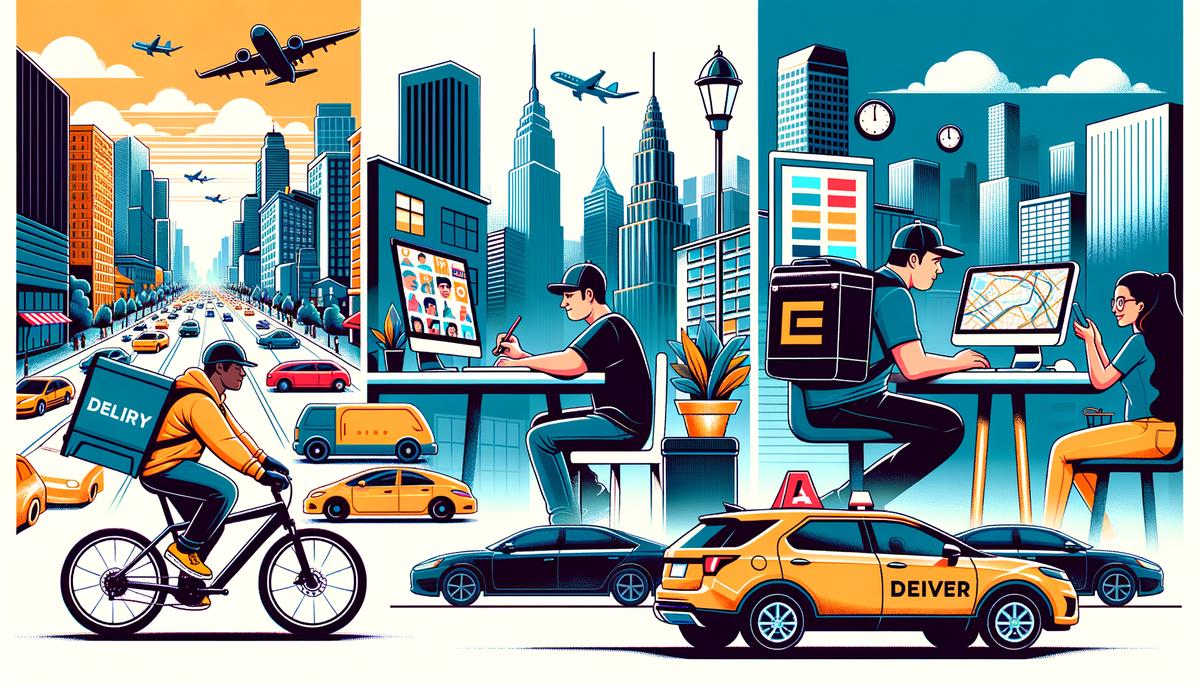
UK Job Market Trends 2024
The landscape of work and employment is continuously shifting, presenting new challenges and opportunities alike. As we examine the current trends, it becomes evident that the job market is undergoing significant transformations, influenced by technological advancements, societal shifts, and a growing emphasis on diversity and flexibility. This discussion aims to shed light on these changes, offering insights into how they are reshaping the way we think about careers and professional growth.
Remote Work Evolution
Remote job opportunities have skyrocketed in the UK since 2024, reshaping how both employees and employers view the workplace. A significant chunk of companies now dangles the carrot of fully remote positions. On the flip side, a hybrid model has become the middle ground, offering a bit of both worlds to those who fancy it. This shift is more than just about where people park their laptops to work; it’s altering job seekers’ wish lists, with many prioritizing flexibility over the traditional trappings of office jobs.
The percentage of businesses rolling out fully remote roles has seen an upward trajectory, nudging against those still clinging to conventional office-based models. Yet, not all sectors sprint at the same pace towards this remote work finish line. IT and digital marketing are at the forefront, pumping out remote opportunities like there’s no tomorrow. Meanwhile, more traditional fields, think finance or healthcare, dip their toes more cautiously into these waters.
Job seekers are singing a different tune these days, with many echoing a stronger preference for roles that let them ditch the commute. This demand for remote positions isn’t just about ditching the office attire either; it’s a quest for a better work-life balance, the flexibility to work from anywhere, and cutting down on those pesky commuting costs.
However, not every industry is jumping on the bandwagon with equal enthusiasm. Some sectors find the transition to remote work smoother due to their nature of work—software development and content writing stand as prime examples. On the contrary, fields that rely heavily on direct human interaction or specific equipment located at the business premises are lagging. Consider manufacturing or healthcare; these sectors face inherent challenges in adopting a fully remote paradigm.
As companies adapt to the increasing demands for remote positions, those stuck in yesteryear’s ways risk being left in the digital dust. Offering remote work isn’t just a perk anymore; it’s morphed into a strategic move to attract top talent in a competitive market. The ripple effect on the job market is palpable: a widening gap between industries eagerly embracing this trend and those struggling to shake off the anchor of tradition.
Amidst this evolving landscape, job seekers are also sprucing up their expectations and skill sets to match the remote work reality. The pursuit of freedom and flexibility has become a rallying cry. They’re not just hunting for any job; they’re selective, eying positions that promise autonomy, flexibility, and a decent work-life blur.
In essence, as 2024 unfolds, remote work continues to mold the UK job market into something new, setting the stage for an intriguing exploration of how work gets done. With tech-savvy industries leading the charge and others cautiously following suit, one thing’s clear: the ground beneath the traditional office setup is shifting, perhaps more rapidly than we ever anticipated.

Skills in Demand
Analytical reasoning stands out as a cornerstone skill eagerly sought by employers across the UK. In a landscape where decision making increasingly leans on data, professionals adept at dissecting and interpreting information are in high demand. It’s a skill that transcends specific industries, proving valuable in finance, healthcare, and beyond.
Cybersecurity expertise has cemented its place on the list, mirroring global concerns about data breaches and digital threats. With every sector’s digital footprint expanding, safeguarding sensitive information has become paramount. This demand heralds golden opportunities for those with a knack for protecting digital realms.
Sustainability knowledge is surging up the priority ladder, reflecting a broader societal shift towards eco-conscious business practices. Companies are keener than ever to integrate sustainable strategies into their operations, sparking a hunt for talent who can navigate the green transition with finesse.
Project management proficiency remains a stalwart on employers’ wish lists, particularly the agility to manage projects in fast-paced environments. The traditional siloed approach is giving way to dynamic, cross-functional team leadership, highlighting the need for versatile project managers.
Cloud computing skills soar in relevance as businesses migrate operations to cloud platforms for enhanced efficiency and scalability. Understanding the intricacies of cloud services, from Amazon Web Services (AWS) to Microsoft Azure, positions job seekers advantageously in the tech and business sectors.
Emotional intelligence (EQ) is increasingly recognized as a key driver of workplace success. The ability to empathize, collaborate effectively, and navigate social complexities contributes to stronger team dynamics and leadership.
Critical thinking skill has perhaps never been more valued, as industries face complex challenges requiring innovative solutions. Employers prize those who can critically evaluate information from various sources to guide strategic decisions.
Adaptability shines brightly as a sought-after trait, especially as businesses pivot in response to rapid technological advancements and changing market needs. Workers who can swiftly adapt to new roles or environments help companies stay competitive and resilient.
Digital marketing acumen, particularly proficiency in SEO and content marketing, reflects the growing importance of online presence across sectors. As commerce continues on its digital trajectory, expertise in driving online engagement becomes crucial.
Lastly, AI engineering and machine learning expertise stands at the forefront of technological skills craved by employers. With AI applications sprouting across various sectors, from finance to healthcare, the ability to design, implement, and refine AI systems offers a clear competitive edge.
For those looking to upskill, a plethora of online courses and certifications are available, ranging from specialized platforms like Coursera and Udacity to industry certifications directly from tech giants like Google and Microsoft. Local workshops and seminars also offer valuable networking opportunities, often leading to direct job leads or collaborations. Meanwhile, for soft skills like EQ and adaptability, mentorship programs and professional seminars can provide essential growth opportunities.
As the job market continues its relentless evolution, aligning one’s skill set with the needs of tomorrow is no mere advantage—it’s a necessity. The rapid pace of change may pose challenges but also opens doors for those ready to step through them, armed with the right mix of technical savvy and soft skills critical for success in 2024 and beyond.

Emerging Job Sectors
In the bustling landscape of the UK’s job market, green energy is lighting up the path to what looks like an electrifying future. Spearheaded by the government’s commitment to reducing carbon emissions, this sector is not just expanding, it’s exploding with opportunities. Wind and solar energy companies are on the lookout for engineers, project managers, and sustainability specialists who can contribute to the UK’s ambition of becoming a zero-carbon economy.
With the flick of a switch, let’s illuminate tech, a sector that continues to morph at a pace only comparable to the speed of light. As businesses digitize operations and e-commerce boomerangs to new highs, software developers, data analysts, and digital transformation consultants find themselves in hot demand. This surge is propelled by innovations in AI, where machine learning engineers and data scientists are crafting the future, byte by byte.
On another front, the healthcare realm is pulsing with growth, thanks in part to an aging population and an intensified focus on mental health. The calls for medical professionals, ranging from general practitioners to specialist nurses and mental health counselors, are loud and clear. This sector is not just growing; it’s becoming more nuanced, with roles like geriatric care specialists and telehealth technicians carving out their own niches.
For those eyeing a leap into these booming fields, the path is dotted with numerous stepping-stones. Skills in renewable energy technology or environmental science are beacon lights for those drawn to green energy. The tech universe orbits around programming languages, data analysis proficiency, and an intimate understanding of AI and machine learning – skills that can often be sharpened through online platforms rich in tech courses.
Healthcare aspirants might find their calling nurtured through specific medical training or caregiving certifications. Yet, across all these fields, soft skills like problem-solving, communication, and resilience shine brightly, often drawing the line between a good candidate and a great one.
Getting your foot through the door of these expanding sectors could also benefit from strategic networking – think industry conferences, LinkedIn dialogues, and participation in community projects related to your field of interest. Such engagements can unearth opportunities that are often not advertised and provide a platform for showcasing your passion and skills directly to those who matter.
As these sectors flourish, prospective jobs mutate, creating roles that today, might seem straight out of a science fiction novel. It’s not just about being ready for the future but shaping it with a blend of curiosity, continuous learning, and an unwavering commitment to adaptability.
In summary, while the canvas of the UK’s job market in 2024 is vast and varied, sectors such as green energy, tech, and healthcare are undoubtedly leading the charge. With their rapid growth fueled by innovation, sustainability goals, and evolving societal needs, these fields offer a fertile ground for job seekers equipped with the right skills and mindset to thrive. As these industries evolve, staying proactive, seeking out further education, and building a versatile skillset are key strategies for those aiming to plug into these dynamic employment areas.

Impact of AI and Automation
Shifts in the UK job landscape, largely driven by advancements in AI and automation, present a dual-edged sword. On one end, certain tasks become automated, nudging workers towards roles that machines can’t easily replicate. This automation pivot is starkly visible in sectors like manufacturing, where routine, repetitive tasks are increasingly being handed over to robots. Yet, paradoxically, this trend paves the way for new job creation, especially in managing, programming, and maintaining these AI systems and robots.
The ripple effect of AI’s evolution touches sectors beyond tech and manufacturing. Retail, once a dominion of human interaction, sees e-commerce giants betting big on AI for inventory management and customer service, nudging traditional sales roles into obsolescence. Conversely, demand for tech-savvy marketing strategists skilled in leveraging AI for personalized shopping experiences spikes, proving that automation’s tide lifts boats in unforeseen ways.
Businesses in the UK promptly realize that staying relevant in an AI-driven world demands a workforce adaptable to ever-changing technologies. This acknowledgment ushers in robust internal training schemes and partnerships with educational institutions. Employees are encouraged, sometimes financially incentivized, to embrace upskilling and reskilling, transitioning from roles vulnerable to automation to becoming stewards of technology itself. Through concerted efforts in promoting STEM education early on and fostering a culture of continuous learning, companies aim to sculpt a workforce not just impervious to AI’s encroachment but one that thrives alongside it.
Against this fast-evolving backdrop, social and emotional skills emerge as invaluable currency. In an ironic twist, as machines take on more tasks, human-centric skills such as empathy, leadership, and complex problem-solving become more prized than ever. Sectors like education and healthcare, reliant on nuanced human interaction, underscore this trend. A teacher’s role, for instance, evolves to focus more on mentoring and critical thinking facilitation as AI-enabled platforms handle raw instructional content delivery.
Furthermore, this technology upheaval reshuffles the entrepreneurial deck. Startups mushrooming around AI and automation solutions receive a warm welcome from investors and government alike. Innovations aimed at enhancing workplace safety, improving process efficiencies, or democratizing access to education seduce those holding the purse strings. This entrepreneurship vigor injects fresh energy into the economy, spotlighting the UK as a cradle of technological innovation and a magnet for talent willing to ride the AI and automation wave.
Yet as bright as some areas shine, shadows loom where transitions lag. The stark digital divide becomes painfully apparent in regions slow to adopt new technologies or where investment in education and training falls short. Unemployment concerns simmer in these pockets, compelling policymakers to navigate the tightrope between fostering technology advancements and ensuring equitable access to the opportunities they create.
In sum, while AI and automation indubitably sculpt a new UK job market contour—phasing out some roles while birthing others—the narrative isn’t one of doom but of adaptation. As companies and their workforces lock arms to waltz with these changes, continuous learning and flexibility stand out as the dance moves of choice to flourish in tomorrow’s employment orchestration. Echoing this sentiment, robust government strategies aimed at strengthening the digital infrastructure and re-skilling programs wire the UK for resilience amid technological tsunamis, looking optimistically to a future where humans and machines work in concert.

Freelance and Gig Economy Growth
While the freelance and gig economy in the UK continues to skyrocket, as 2024 approaches, a staggering surge in participation showcases its pivotal role in reshaping the traditional employment model. With millions now navigating the freelance landscape, it signals a profound shift in work architectures across the nation. Data delineates a broad array of gigs becoming commonplace, from tech-centered roles to creative endeavors, illustrating a diversification powerfully influencing employment trends.
Gig tasks, once pigeonholed into simplistic, task-oriented jobs, have blossomed into rich opportunities spanning graphic design, programming, consulting, and beyond. A notable trend is the ascent of platform-based work, where digital marketplaces offer a seamless bridge between gig workers and potential clients. Uber, Deliveroo, and Upwork typify this evolution, enabling greater economic participation with unprecedented accessibility.
The ripple effects on traditional employment are profound, instigating companies to reconsider rigid work structures. The allure of gig work—its flexibility and autonomy—has fostered a competitive atmosphere, compelling businesses to innovate to retain talent. Thus, flexible hours and remote working capabilities have transitioned from perks to prerequisites in job roles across sectors.
Yet, this boom is not without its challenges. The rise of gig work engenders debates around labour rights, benefits, and security, areas historically safeguarded within conventional employment paradigms. Meanwhile, the gig economy’s growth feeds into the narrative of a job sector in flux, where agility and diversification become survival strategies for both individuals and businesses.
Economically, the gig sector sparks dual narratives: It augurs independence and entrepreneurial grit for many, while simultaneously underscoring vulnerabilities tied to irregular incomes and scant benefits. Legislation treads a fine line, seeking to protect workers without stifling the innovation propelling this sector’s growth.
In essence, as the UK strides into 2024, the gig economy represents a dual-faced Janus: on one side, it’s a harbinger of a vibrant, flexible job market; on the other, it’s a precipitate of pressing dialogues around the future of work, necessitating thoughtful navigation as this economic segment continues to unfold.

Diversity and Inclusion Initiatives
Embracing diversity and inclusion within the UK job market has led to significant shifts in corporate policies and hiring practices, aiming to create more equitable workplaces. Companies increasingly recognize the value of a diverse workforce, which reflects in their recruitment strategies and efforts to eliminate bias. Diversity quotas, once seen merely as statutory requirements, have evolved into integral aspects of organizational strategy, signaling a commitment to change beyond mere compliance.
Tech giants and startups alike now chase the talent embedding equality and accessibility into their core values, acknowledging that diverse teams are more innovative and effective. Efforts to reach underrepresented groups have ramped up, with initiatives targeting women in tech, ethnic minorities, and people with disabilities becoming commonplace. These programs don’t just talk the talk; they walk the walk by implementing mentorship, sponsorship, and tailored training programs designed to level the playing field.
The ripple effects of these efforts are visible beyond the tech industry. Sectors such as finance and healthcare, traditionally slower in adopting flexible models, now pioneer diversity and inclusion practices in anticipation of future needs. From internship programs aimed at students from diverse backgrounds to leadership training that emphasizes empathy and cultural awareness, the narrative is clear: inclusivity is not just nice to have; it’s essential for business resilience and growth.
However, it’s not all smooth sailing. While strides have been made, gaps remain in achieving true inclusion. For instance, despite the increased visibility of Black, Asian, and Minority Ethnic (BAME) individuals in advertising and corporate leadership, their representation at senior levels is still lacking. This discrepancy highlights the need for sustained efforts in mentorship and career progression opportunities for minority employees.
Moreover, the quest for gender equality in the workplace continues, with a significant gender pay gap persisting across many industries. Companies are now under increasing pressure to address this gap, not only to meet legal requirements but also to attract and retain top female talent who expect and demand equal treatment and opportunities.
Access for people with disabilities has also become a focal point. Beyond mere compliance with accessibility laws, forward-thinking companies are remodeling their workspaces and digital interfaces to be more inclusive, recognizing the unique perspectives and abilities that individuals with disabilities bring to the table.
Notably successful diversity and inclusion initiatives often share a common thread: they’re championed by top leadership and woven into the fabric of the company culture. Transparency in reporting diversity metrics, while initially viewed with skepticism by some organizations, has proven instrumental in tracking progress and holding companies accountable.
In spotlighting areas for improvement, it’s clear that diversity training programs need to evolve beyond one-time sessions. Continuous, nuanced education that addresses unconscious bias and provides practical tools for fostering an inclusive environment is key. Furthermore, employee networks and affinity groups have emerged as powerful platforms for minority groups to share experiences, offer support, and drive internal changes.
In conclusion, while the trajectory towards a more inclusive UK job market in 2024 is encouraging, it’s evident that achieving lasting change requires commitment at every level of an organization. From revamped recruitment practices to embedded cultural values that celebrate diversity, the journey is ongoing. As businesses continue to adapt and innovate in this area, the goal remains steadfast: to create a job market where everyone has the opportunity to thrive, irrespective of their background.

In conclusion, the journey through the evolving job market reveals a critical insight: the importance of adaptability and continuous learning. As industries transform and new sectors emerge, the ability to adjust and grow with these changes stands out as a key determinant of success. This insight not only guides individuals in their career paths but also shapes the strategies of companies striving to thrive in a dynamic employment landscape.

Share
Facebook
X
LinkedIn
Telegram
Tumblr
WhatsApp
VK
Mail